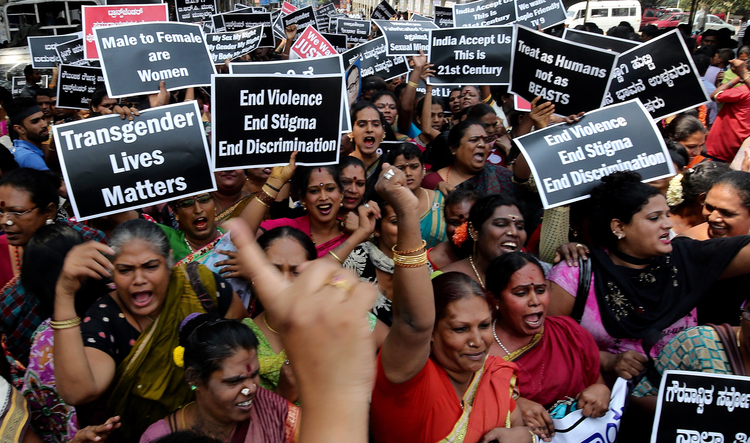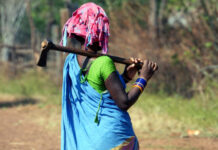It had been just four days after the Transgender Persons(Protection of Rights) Bill 2019 was tabled in the Rajya Sabha on November 20, that the members of the transgender community marched in the 12th Queer Pride Parade that was held on Sunday.
The Pride Parade highlighted the transgender community’s fear and apprehensions, concerns and critical views on the controversial Bill.
The community feels that the Bill is far removed from the ideals and values enshrined in the landmark 2014 judgement made by the Supreme Court of India. The landmark judgement was made in the National Legal Services Authority v. Union of India(or NALSA) and was applauded for its progressive stance and the chance that it allowed at self-determination of gender.
The critics of the Bill argue that once passed it will violate the very rights and dignity of the people it claims to protect.
It also alarms the community that the bill was passed by the Lok Sabha on August 5 without much debate or deliberation. The bill was also cleared despite the opposition’s efforts to send it to a select committee. The government got 74 votes defeating the opposition motion, which only got 55 votes.While members of the transgender community and activists working on LGBTQ issues have raised several doubts and reservations about the Bill, the general reader is not quite aware as to what they are and why the Bill is so vehemently getting opposed by the community.
Let us look at some of the reasons for which the bill is being opposed and problematised by the community.
- Denial of the Right to Self-Determination
If the Bill is implemented in full spirit, transgender persons will no longer be able to have the right to self-determination as guaranteed to them by the NALSA. Instead a transgender person will have to apply to the District Magistrate for a certificate of identity indicating their gender as “transgender.” If the transgender person undergoes a surgery to convert into a male or a female, a revised certificate has to be obtained. The District Magistrate will determine the “correctness” of the medical certificate issued by a Medical Superintendent. So transgender persons will no longer have the right to determine their own gender free of the mandate of any medical certificate or sex-reassignment surgery. It is then only natural that such a recommendation will subject transgender persons to further demeaning and harassing medical scrutiny.
- Heightened Bureaucratic Rules, Reduced Dignity
The Bill allows transgender persons to only receive identity certificates which recognise them as “transgender persons” who would like to identify as a man or a woman. This will again make the transgender person victim to an alienating bureaucratic exercise.
- Sex-Reassignment Surgery and the Lack of Vision
The Bill does not clearly indicate whether transgender persons would have free/subsidized access to medical council as far as the sex-reassignment surgery is concerned. It is important to gain clarity on this aspect because it is this surgery which is the basis for the identity certificate without which a transgender person would not be unable to get official documents in their desired gender and name.
- No Clarity on the Definition of “Discrimination” Against Transgender Persons
The Bill does not clearly indicate what it means by discrimination and what such a broad category would entail. In such a context it becomes important to ask whether it can then include the variety of discriminations that the transgender persons face on a day to day basis. Article 377 acknowledged the fact that transgender persons face abuse and sexual assault, often at the hand of officials responsible for enforcement of the law itself. Thus there are great chances that the Bill would fail to recognise that transgender persons may be victim of rape and abuse, because the Indian Penal Code recognises rape in strict terms as men being the perpetrators and the women being the victims. Moreover, the Bill has no clarity on what constitutes the term sexual abuse. Moreover, the lack of clarity is particularly disturbing for the transgender community as crimes against them may be difficult to report and prove. So one of the greatest problems with the Bill is that it fails to bridge the gap between judicial protection and the day to day violations faced by the transgender persons.
- No Reservation for Transgender Persons
A major flaw with the Bill is that it does not have any provision to provide reservation in education and employment for transgender persons. This is against the mandate of the NALSA. Such a lapse on behalf of the judgement will continue to keep alive the discrimination and violation of the rights of transgender people and keep them socially, politically and economically marginalised.
- A Bill that Defeats its Own Purpose
The Bill fails the very purpose for which it claims to exist. We know that the transgender community has faced discrimination for generations and has been denied the basic dignity and respect that any individual requires to survive in the society. They have been denied access to education, housing, healthcare, employment and opportunities that are accessible to the rest of society. The denial of basic human rights has kept the transgender community economically impoverished, socially fragmented and politically marginalised. The Bill in its present form continues this tradition of suppression and marginalisation of the transgender community and pushes them further into obscurity. It also ridicules and mocks their struggles by failing to secure their fundamental rights.
It is high time the Rajya Sabha recognises the severe follies with the Bill in its current form and takes into account the suggestions, rectifications, additions and revisions that the transgender community asserts are necessary for it to truly become inclusive and lay the foundation for a just social order.














